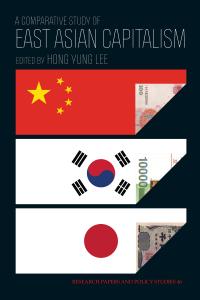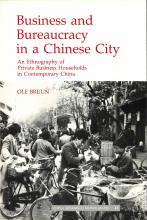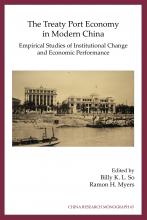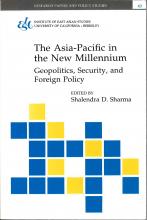A Comparative Study of East Asian Capitalism
A Comparative Study of East Asian Capitalism
Hong Yung Lee, ed.
This volume examines similar institutions in similar functional areas in China, Japan, and South Korea. To understand the findings, the authors suggest "institutional templates," a framework that considers the ways in which each country is oriented toward authority, exchange, and networks. The book as a whole demonstrates the intellectual utility of a broad comparative study of East Asian economic development.
As a nonprofit academic press, we need your support to publish our books. Your gift can help us make more of our titles available as e-books. DONATE NOW
Title information
This book is an initial attempt to compare China, Japan, and South Korea, three close geographical and cultural neighbors whose development trajectories, though previously divergent, have been moving more recently toward convergence. This edited volume examines similar institutions in similar functional areas within the three countries. To understand the findings, the authors suggest a working concept of "institutional templates," a framework that considers the ways in which each country is oriented toward authority, exchange, and networks. We hope that the book as a whole will demonstrate the intellectual utility of a broad comparative study of East Asian economic development.
Contributors:
Lowell Dittmer, Professor, University of California, Berkeley
Fengxia Jiang, Assistant Professor, Beijing Foreign Studies University
Myung-koo Kang, Assistant Professor, Baruch College, The City University of New York
Joongi Kim, Professor, Law School of Yonsei University
Yong-Hak Kim, Professor, Yonsei University
Yong-min Kim, Professor, College of Business Administration, Kookmin University
Hong Yung Lee, Professor, University of California, Berkeley
Seungjoo Lee, Professor, Chungang University
Kun-Chin Lin, Lecturer, Department of Politics and International Studies, University of Cambridge
Pingqing Liu, Professor, School of Management and Economics, Beijing Institute of Technology
Hideaki Miyajima, Professor, Graduate School of Commerce, Waseda University
Sang-Young Rhyu, Professor of Yonsei University
Junxi Shi, Ph.D. Candidate, Beijing Institute of Technology
Yul Sohn, Professor, Yonsei University
Ji-Whan Yun, Assistant Professor, Ewha Womans University
Hong Yung Lee, ed.
Hong Yung Lee is professor emeritus of political science at the University of California, Berkeley. His reseach focuses on the states and economies of East Asia. He has edited several publications, including Korean Options in a Changing International Order (IEAS, 1993), Prospects for Change in North Korea (IEAS, 1994), and A Comparative Study of East Asian Capitalism (IEAS, 2014).
B.A., Yonsei University; Ph.D., University of Chicago
A Comparative Study of East Asian Capitalism (RPPS 46)
Contributors – vii
Part I. Introduction
1. Précis
Hong Yung Lee
2. Convergence and Divergence: Three Paths toward Modernization in East Asia
Hong Yung Lee
Part II. Financial and Labor Reforms
3. Government Intervention for Resolving Non-Performing Loans in Japan and South Korea, 1998–2006
Myung-koo Kang
4. Financial Reform in China: The Chinese Style of Marketization
Hong Yung Lee
5. The Double Movement and New Labor Market Regulations in Korea, Japan, and Taiwan
Ji-Whan Yun
Part III. Corporate Governance
6. Moving toward a Hybrid System in Japan: The Case of Corporate Governance Reform
Hideaki Miyajima and Yul Sohn
7. Corporate Governance Reform in Korea in the Post– Asian Financial Crisis Era
Joongi Kim
8. The Evolutionary Path of Corporate Governance in China: The Interdependent Model of State-Owned Enterprises
and Private Enterprises
Pingqing Liu, Junxi Shi, and Fengxia Jiang
9. Multiple Institutional Templates for Corporate China: The Evolution of Industrial Networks during Marketization
Lowell Dittmer and Kun-Chin Lin
Part IV. Networks
10. The Changing Face of Network Capitalism in Korea: A Study of the Corporate Board of Directors' Network
Yong-Hak Kim and Yong-Min Kim
11. The Political Economy of Informal Networks in Japan and South Korea: Amakudari vs. Parachute Appointment
Seungjoo Lee and Sang-Young Rhyu
|
JOURNAL REVIEWS |
|
“The level of detail displayed and thorough coverage of the historic subtleties of economic development in each country must be applauded. The book provides an extremely useful insight and factual repository into the micromechanisms of many aspects of capitalism across East Asia.… [I]n that it more than satisfies its stated aim of alerting scholars to the urgent need for a comprehensive theory that can cover the remarkable economic performances of China, Japan, and South Korea, this book is a resounding success.” ~Alison Hulme, Royal Holloway, University of London, in Pacific Affairs 89, no. 2 (June 2016): 401–402. |




